Preface: Many Eastern Ghouta cities and towns have been subjected to one of the most violent military attacks by the Syrian regular forces and Russian airforce (Syrian-Russian Alliance), from December 29, 2017 to January 20, 2018. The majority of Eastern Ghouta cities and towns were shelled by warplanes and artillery shelling. A large number of weapons have been used during these military operations, which resulted in numerous civilian casualties.
According to Syrians for Truth and Justice( STJ) researchers, residential neighbourhoods in Harasta[1] city were subjected to violent attacks by the Syrian regular forces and their allies, since December 29, 2017, the heaviest of those attacks was on December 30, 2017, where the allied forces committed a massacre of 13 civilians, the majority of whom were women and children.
Several cities and towns in Eastern Ghouta during the period in question were also shelled by concussion rockets, where on January 3, 2018, more than 20 civilians killed and others injured as a result of targeting residential neighbourhoods in Mesraba[2] village by several concussion rockets, and on the 6th and 9th of January 2018, the allied forces committed two massacres in Hamoryah[3] city, which left more than 40 dead, and dozens of wounded.
The weapons used in the military attacks of the Syrian regular forces varied, where on January 13, 2018, the road linking Duma[4] and Harasta cities was shelled by rockets loaded with poisonous gases, which caused the injury to six civilians, including women and children. In Irbin[5] city, the humanitarian situation had been exacerbated by the attacks on the city during that campaign, which led those concerned to form an emergency room, on January 18, 2018, to follow up the affected civilians.
It is worth mentioning that this escalation comes in the context of the ongoing military campaign launched by the Syrian regular forces on Eastern Ghouta on November 15, 2017, following Ahrar al-Sham al-Islamiyya Movement’s announcement of its two-stage battle "They Were Wronged", the first stage was on November 14, 2017, in which the fighting resulted in the kill of a number of Syrian regular forces fighters along with the control of Ahrar al-Sham al-Islamiyya Movement on large portions of the Military Vehicles Management base in Harasta, while the second stage began on December 29, 2017, in which the battles led to impose siege on Military Vehicles Management by Ahrar al-Sham al-Islamiyya Movement, in addition to the latter’s control of Al-Ajami neighborhood, the Automated oven, and Al Hadaeq neighborhood, which stretches along the road between Harasta and Irbin from the west side of the Military Vehicles Management.
These events coincide with the preparation of the "Syrian National dialogue" Congress, which was agreed upon by the sponser states of the ceasefire in Syria (Russia, Turkey and Iran) to be held in Sochi, the Russian city, on 29 and 30 January 2018.
Moreover, the military escalation in various areas of Eastern Ghouta, during the aforementioned period, coincided with other indiscriminate attacks on many areas of Damascus, the capital, and its environs (controlled by the Syrian government) including (Bab Touma, Bab Sharqi, Alassad Suburb, and Barzeh neighbourhoods), which were attacked with a number of mortar shells and missiles, resulted in the death and the injury of dozens of civilians, as well as significant material damage in their property. A large number of those missiles were fired from areas in Eastern Ghouta cotrolled by the Syrian armed opposition factions, specifically from Harasta city, under the control of Ahrar al-Sham al-Islamiyya Movement, according to many testimonies obtained by STJ.
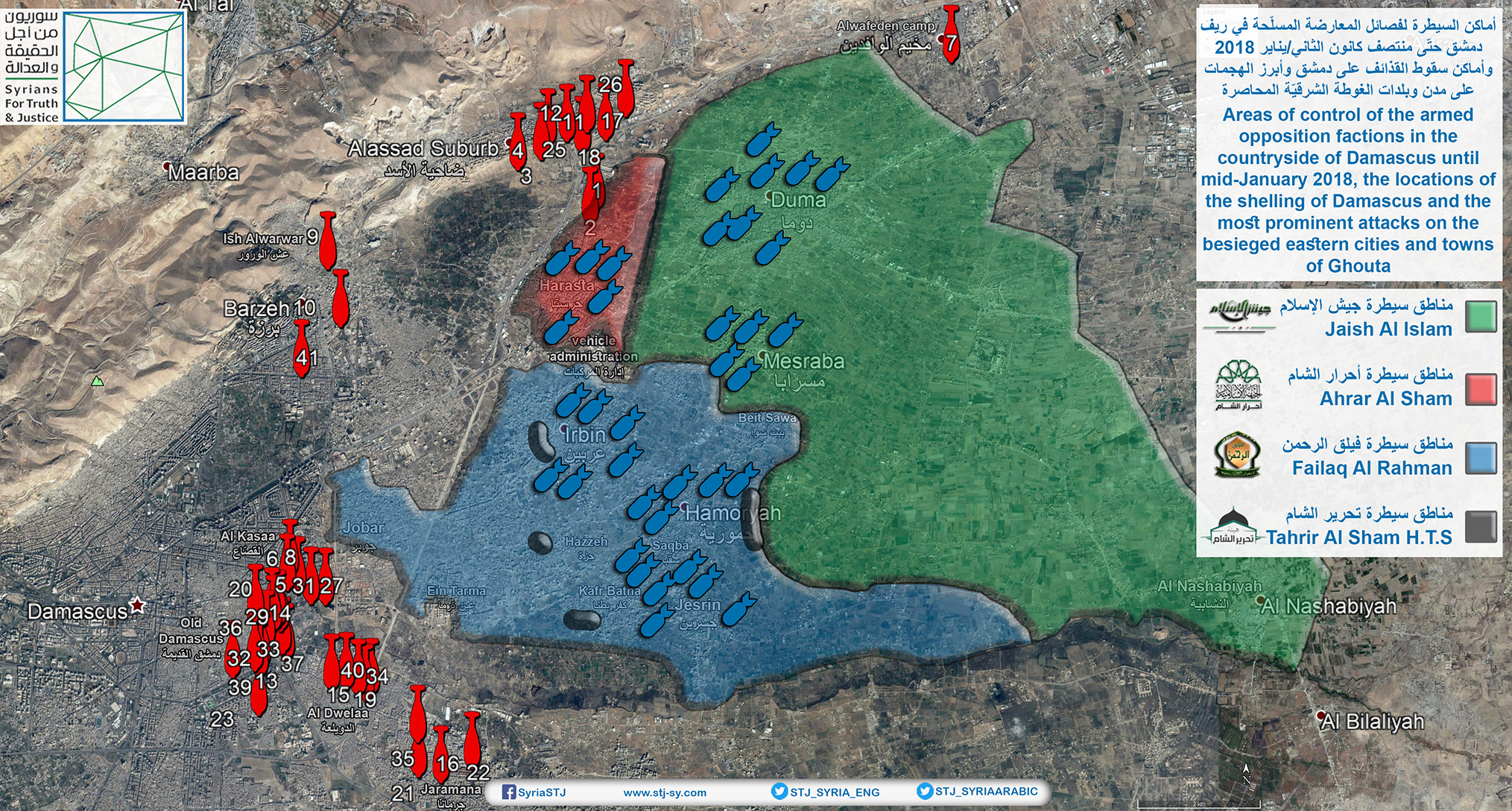
An illustrative map showing the distribution of control between the regime and the opposition in Damascus and countryside until mid-January 2018, in addition to the locations of missles and rockets fell on Damascus, and the most prominent attacks on besieged Eastern Ghouta cities and towns.
First: Targeting Residential Neighbourhoods in Harasta City
The military campaign launched by the Syrian regular forces and their allies on several cities and towns in Eastern Ghouta led to a deterioration of the humanitarian and medical situation and aggravated the disaster in most areas, especially in Harasta, which had the largest share of shelling and raids, and subsequently declared as a disaster area, according to STJ researchers.
On Friday, December 29, 2017, the military campaign against Harasta city began with artillery shelling towards residential neighbourhoods, coincided with the launch of the second stage of "They Were Wronged" battle by Ahrar al-Sham al-Islamiyya Movement. Developments on the ground were accelerated within the following hours and days, according to STJ reporter the regular forces and their allies use their full military strength, including the use of heavy weaponry,
Between December 29, 2017 and January 7, 2018, the residential neighbourhoods of the city were targeted with thermobaric rockets, and during the period in question there were approximately 250 air raids, 12 cluster munitions, 5 hoses filled with TNT, plus hundreds of ground-to-ground “elephant” local-made missiles and artillery shells. The shelling resulted in the death of 27 civilians at least, including seven children and five women, and the injury of more than 130. However, the most bloody attack was on Saturday, December 30, 2018, where the Syrian regular forces committed a massacre of 13 civilians, seven of whom were from one family consisting of five children and their parents, following an air raid that led to the collapse of the building in which they live above their heads, according to STJ reporter.
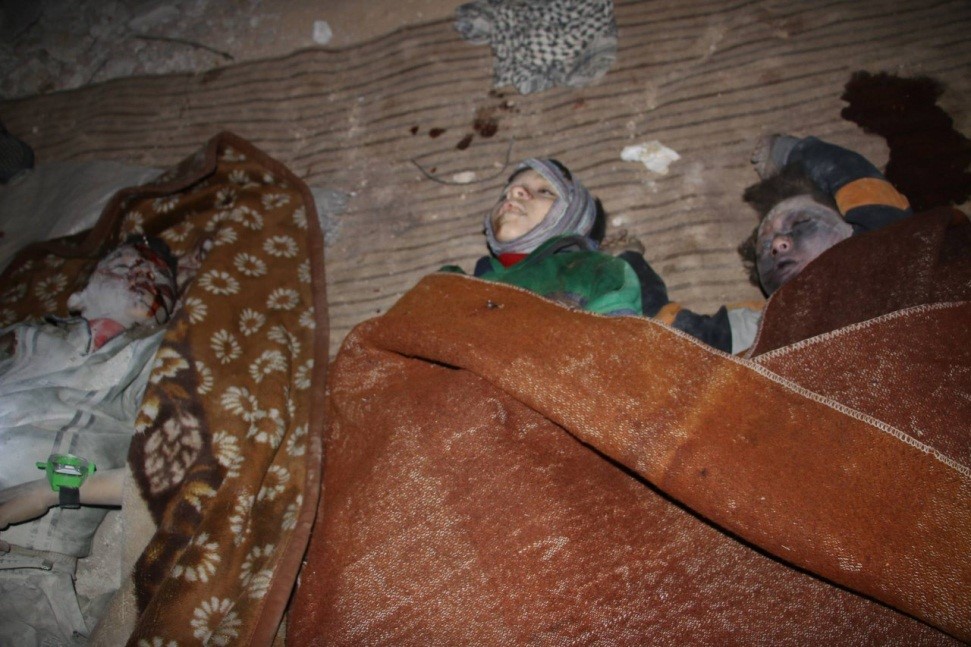
Image shows children who died as a result of the aerial bombardment on Harasta city on December 30, 2017,
Photo credit: The Facebook page of The Syrian Civil Defence in Damascus countryside.
A video footage published by the Civil Defence on December 30, 2017, showed a side of the casualty evacuations from under the rubble as a result of shelling residential buildings in Harasta.
Second: Concussion Rockets Kill 20 Civilians in Mesraba Village
On Wednesday, January 3, 2018, at 7:30 p.m., residential neighbourhoods in Mesraba village were shelled by warplanes believed to be Russian, where five air strikes carrying concussion rockets have been carried out, resulting in dozens of casualties among civilians, killed or injured, according to many testimonies obtained by STJ.
Muhammed al-Bouqaie, one of the civil defence members who rushed to the scene of the attack the moment it occurred, spoke to STJ, saying:
"Immediately after the attack, we rushed to the targeted site, which is on the road links between Mesraba and Duma. Once we get there, the Russian warplanes attacked the village again, and the place targeted this time was not more than a hundred meters away, so many of us rushed there to be shocked with the large number of dead and injured. The Rockets have targeted nearly most parts of the village, not a single neighborhood spared, with the toll of more than 20 dead people, and about 80 injured. Strange concussion rockets were used in raids, which dig deep holes in the ground and explode within them, and that reinforced suspicions among locals that the planes that bombed their village were Russian."
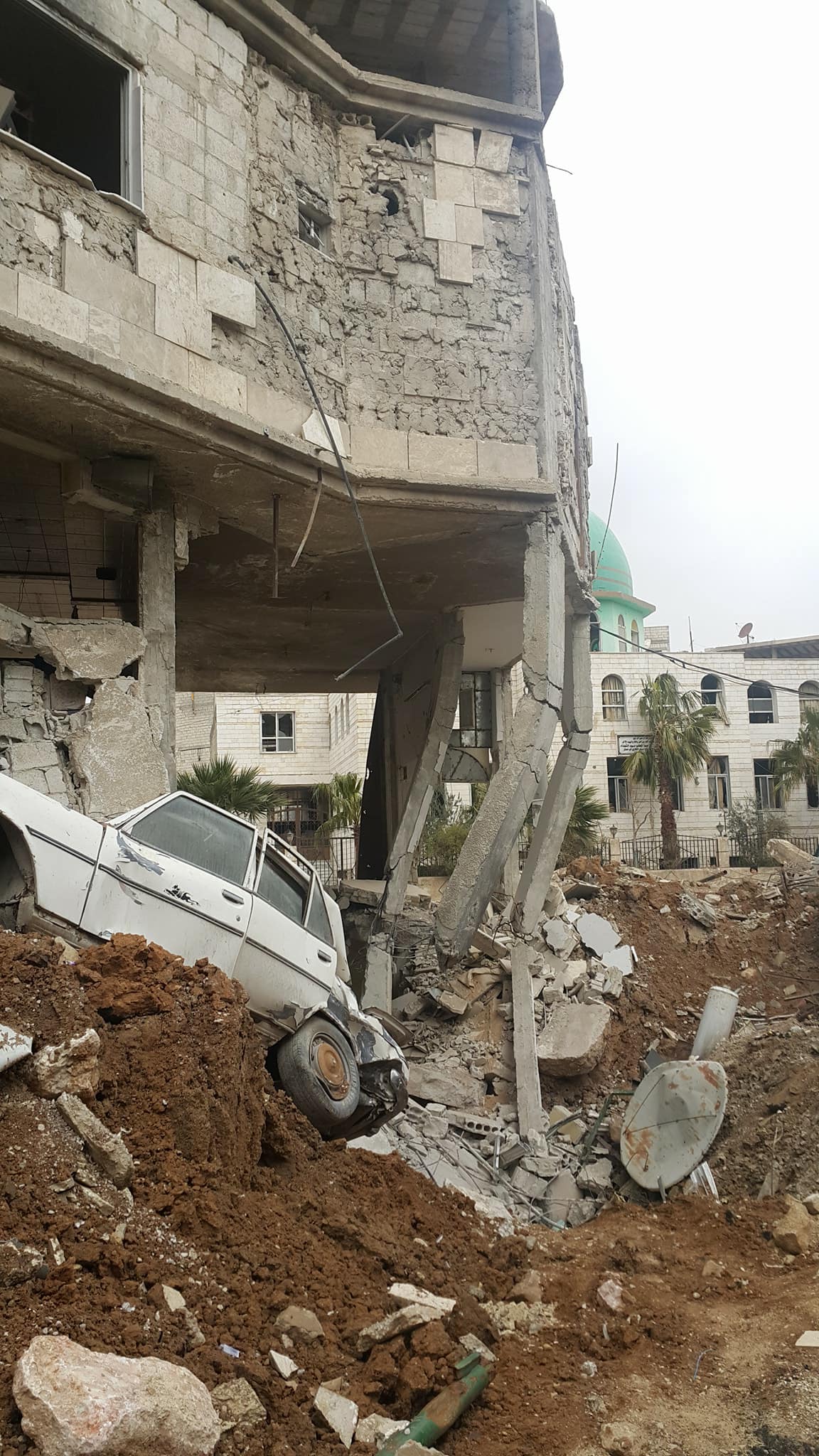
Image shows the location of the fifth concussion rocket, which targeted Mesraba village on January 3, 2018.
Photo credit: STJ
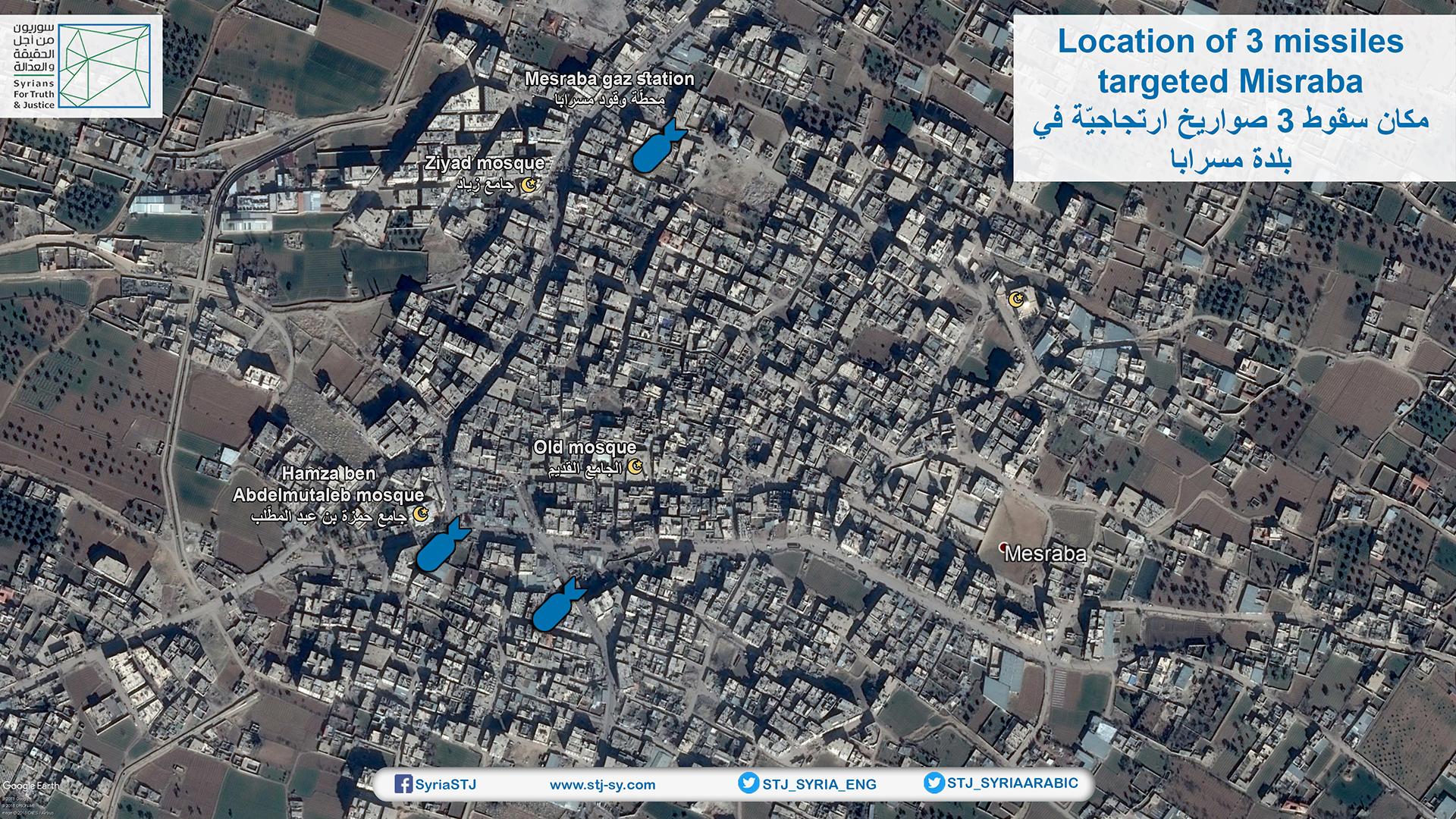
A Satellite image, shows the location of the third, fourth and fifth concussion rocket, which fell on residential neighborhoods in Mesraba village.
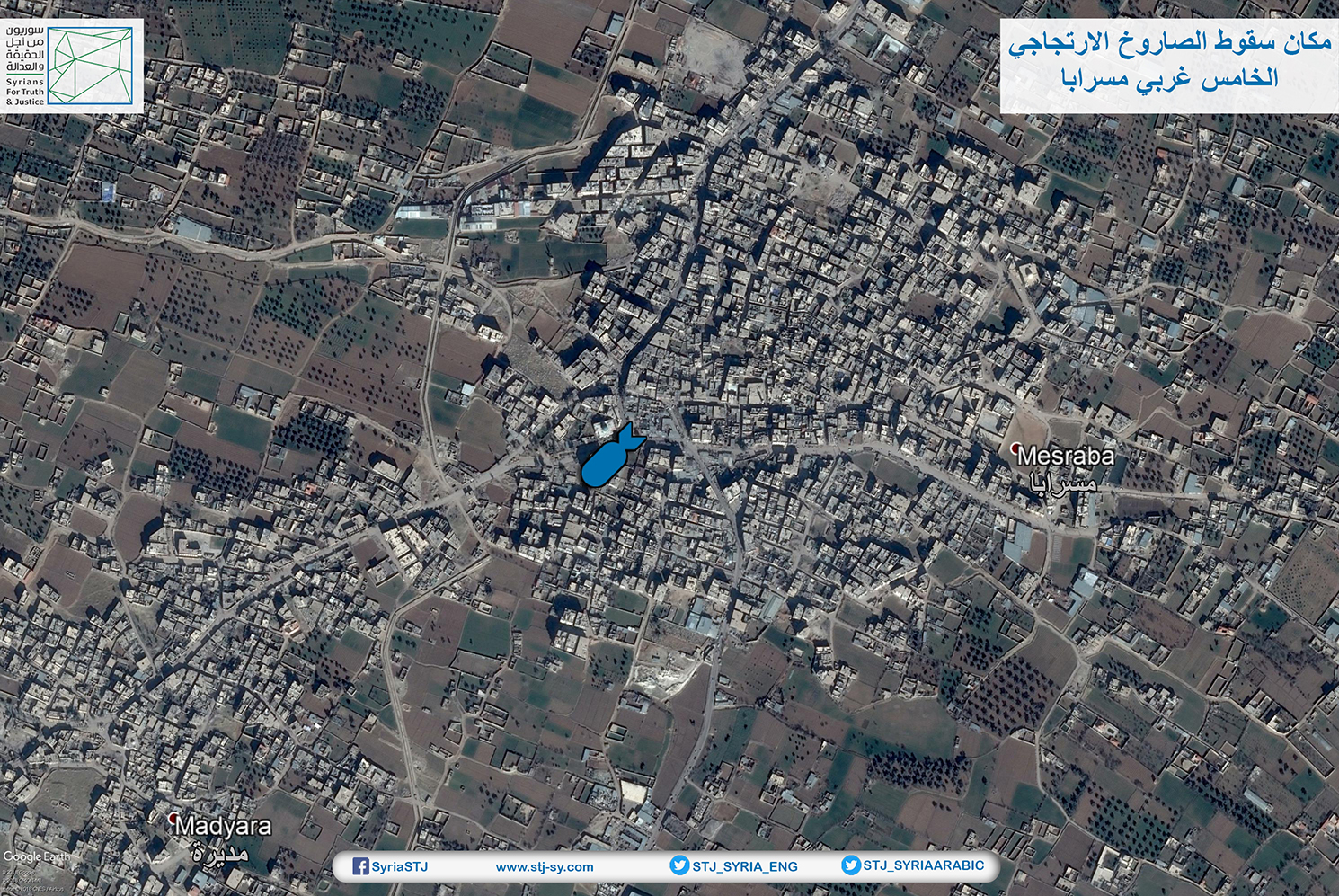
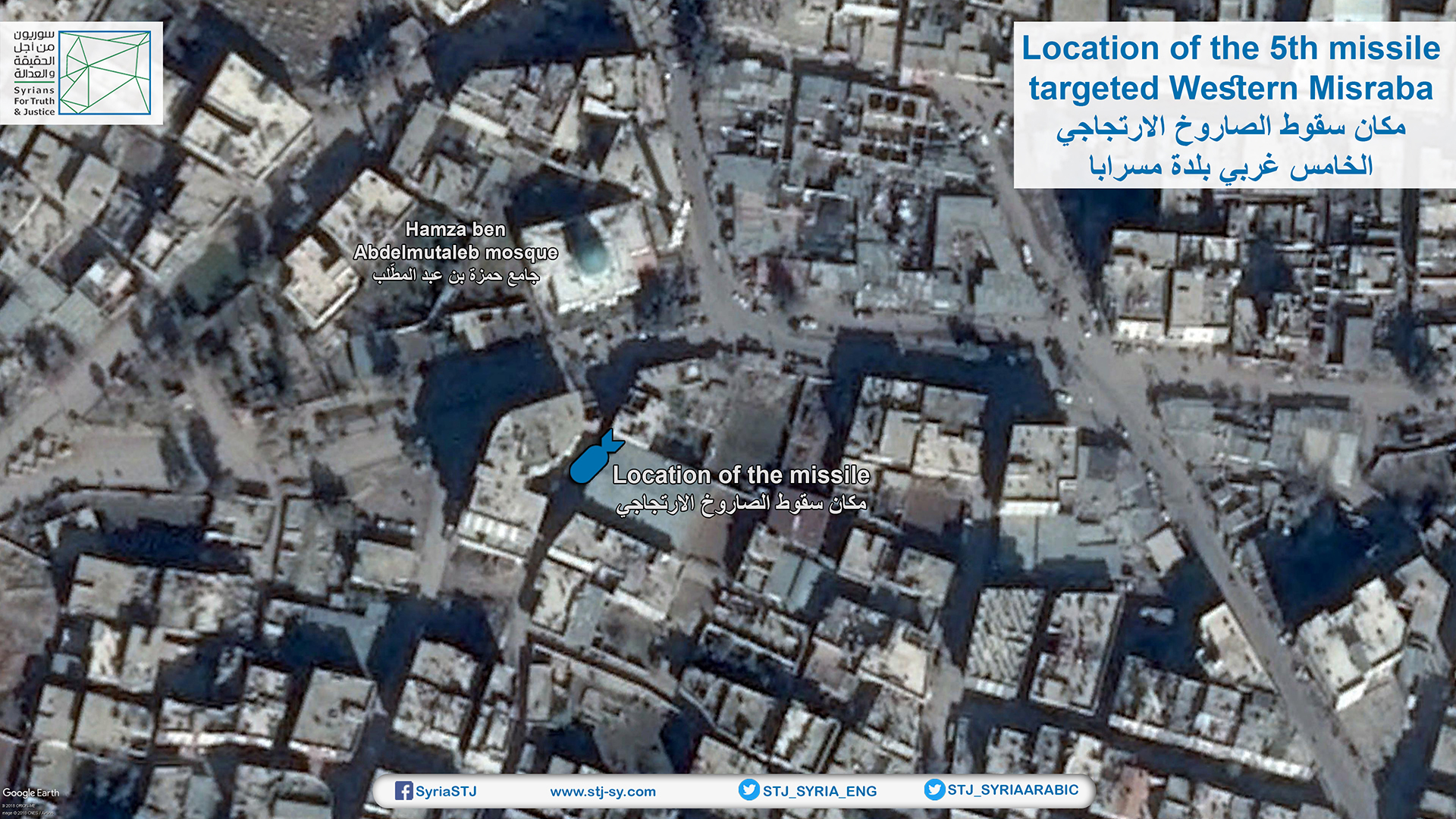
A satellite image illustrates where the fifth rocket landed.
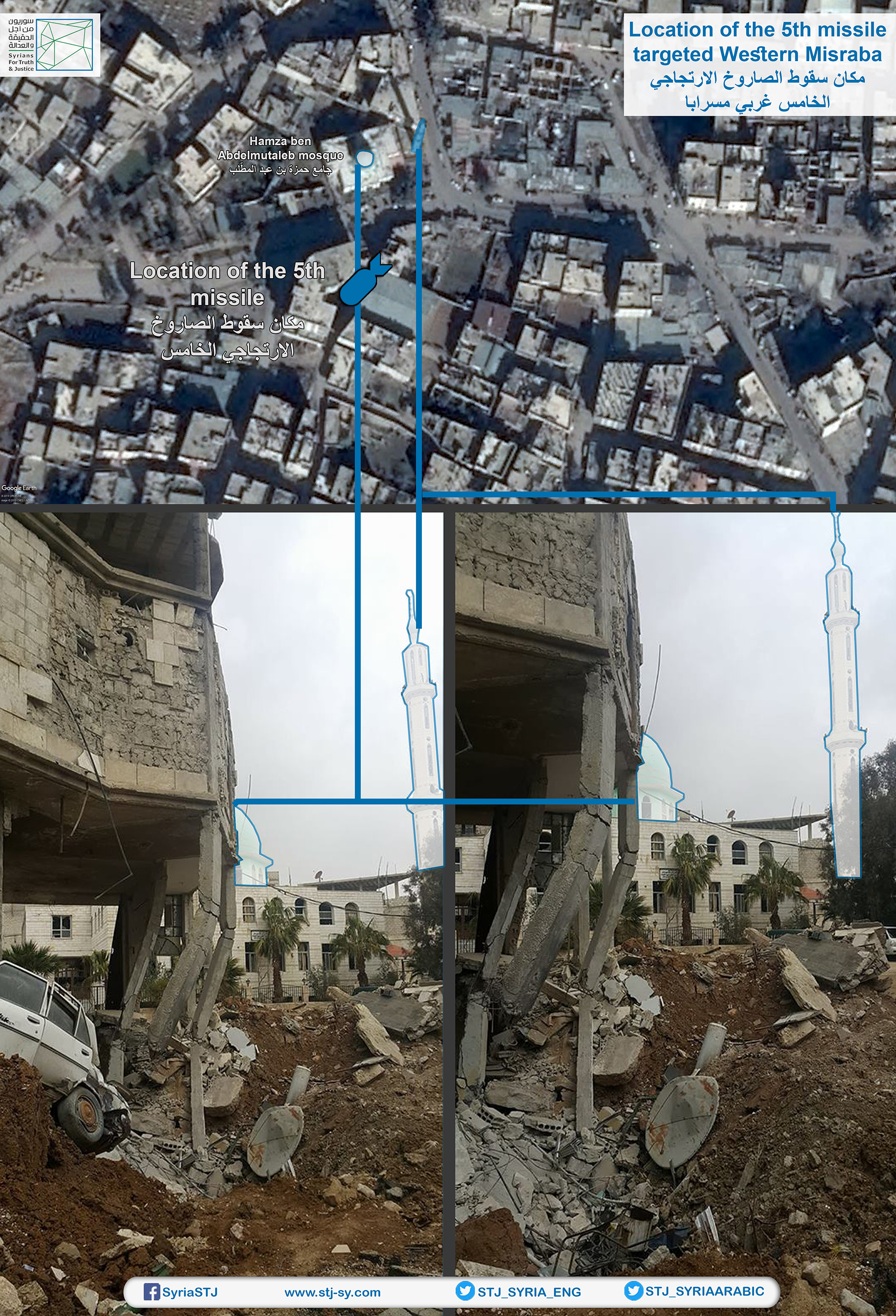
Analysis of visual evidence.
A video footage published by the Civil Defense on January 4, 2018, showed a side of the rescue of some civilians injured by the air raids, which targeted residential neighborhoods in Mesraba village on January 3, 2018.
On the same date, the Facebook page of The Central Channel of Hmeimim Military Base (a non-official page) published a news about its bombardment of "terrorist organizations" in Eastern Ghouta on January 3, 2018, where it said that its bombers targeted the positions of fighters affiliated to the al-Nusra Front ".
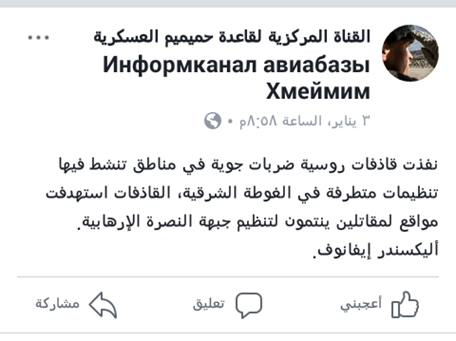
Image shows the Facebook post published by Hmeimim Military Channel (a non-official page) on January 3, 2018
Photo credit: The Central Channel of Hmeimim Military Base (a non-official page)
On January 5, 2018, Damascus countryside’s Provincial Council issued a statement condemning the recent military escalation in Eastern Ghouta, which targeted concentrations of civilians and left a large number of deaths among their ranks, saying that the civilian neighborhoods targeted by Russian bombers are completely devoid of any military presence.
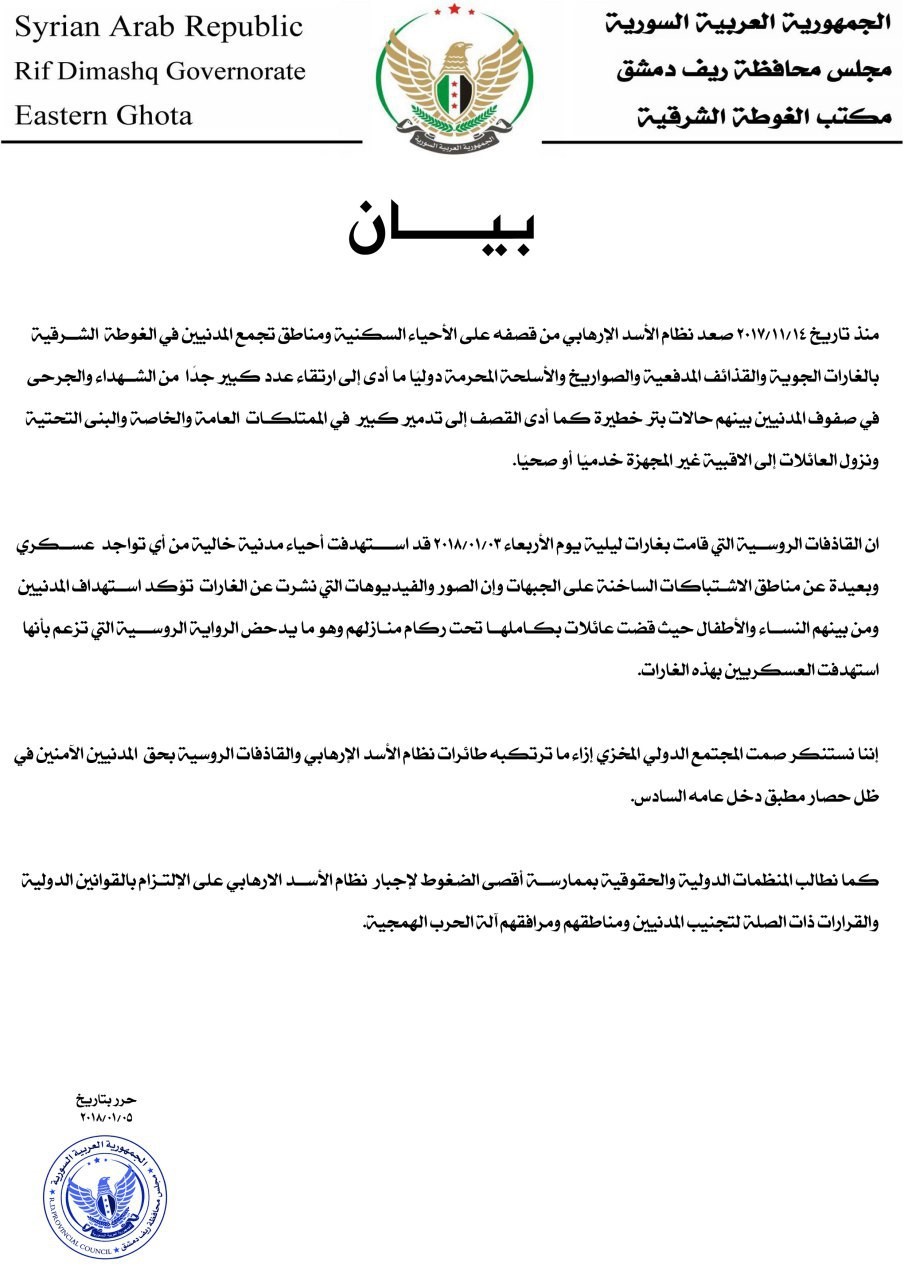
Image of the statement issued by Damascus countryside’s Provincial Council on January 5, 2018.
Photo credit: Ghouta Media Centre.
Third: Two Massacres in Hamoryah City in a Few Days
On January 6, 2018, Hamoryah city was shelled by warplanes believed to be Russian, where a residential compound in the center of the city was targeted with four missiles at once, resulting in the death of 20 civilians and the injury of more than 50 others, as well as the physical damage to civilian houses, according to STJ.
Muhammed al-Khatib, a resident of Hamoryah city, spoke to STJ and said:
"While I was sitting in my house, I heard a loud explosion, my children were very terrified, the explosion followed by screaming and distress call, so I rushed outside to help as many people as possible. Four rockets landed all at once, causing major destruction to civilian houses, and the kill of more than 20 people, mostly children and women, as well as the destruction of more than a hundred houses, which has led to a mass displacement of the population to other areas."
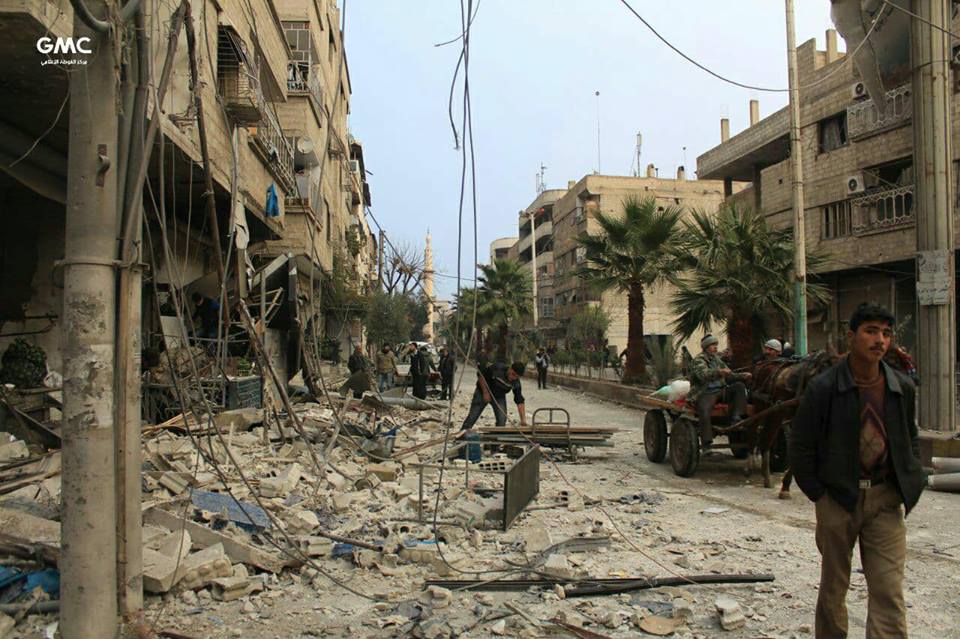
Image shows the location of a rocket fell on a residential compound in the centre of Hamoryah city on January 6, 2017.
Photo credit: Ghouta Media Centre.

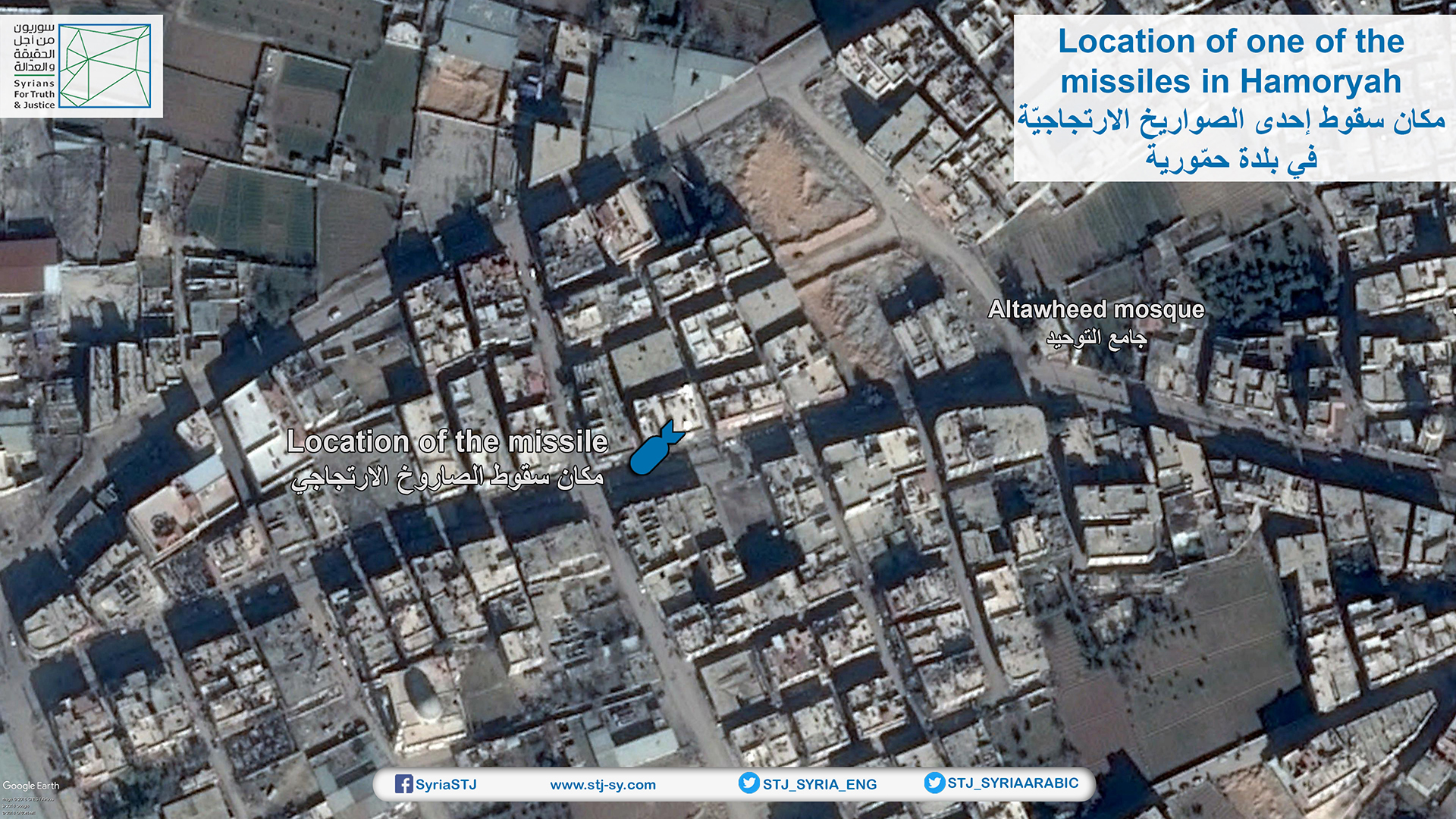
A satellite image illustrates where the missile, mentioned in the above image, fell.

Analysis of visual evidence.
A video footage published by the Civil Defence on January 6, 2018 showed a side of a girl child body’s recovery from the rubble caused by the shelling on Hamoryah city at the same date.
Hamoryah city has not escaped another bombardment on its residential neighbourhoods, specifically on January 9, 2018, as a military aircraft, believed to be Russian also, targeted residential buildings in the city with a concussion rocket, which resulted in the kill of 25 civilians and the injury of dozens, according to many testimonies obtained by STJ. In this regard Ahmed Abbas a native of Hamoryah spoke to STJ saying:
At 12:00 pm, our nighbourhood was bombed with a concussion rocket, though there are no military headquarters in it, the concussion rocket came down with an umbrella, collapsing the buildings over the heads of their inhabitants, as it caused an enormous destruction in the buildings, as well as a large number of deaths and injuries. As for me no one of my family is still alive, my father and grandmother were killed, while my mother and sister were seriously injured. In addition to the kill of five of my uncles, as a result of this targeting."
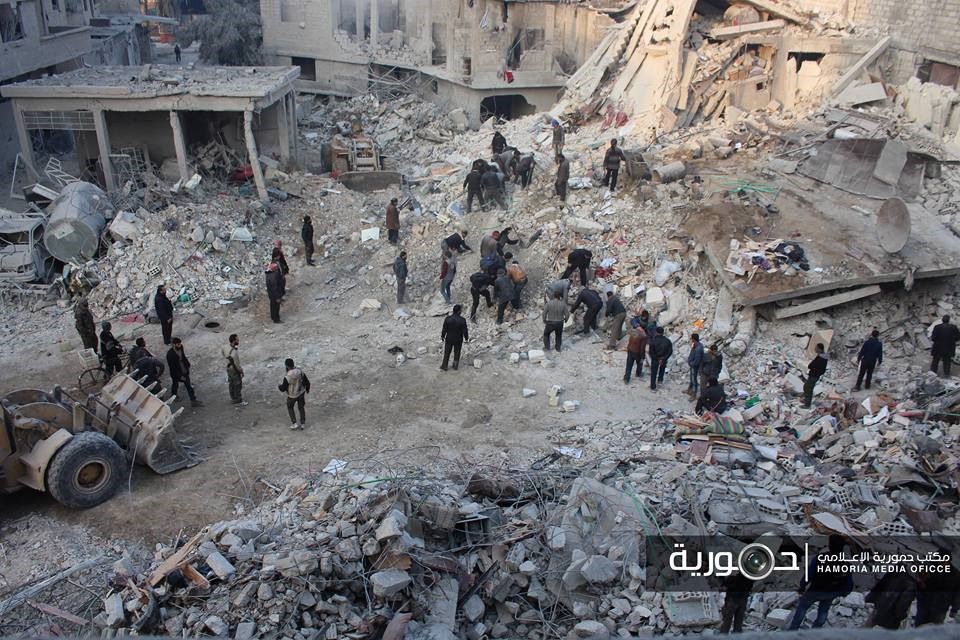
Image shows the location of the concussion rocket which landed on a residential neighbourhood in Hamoryah city on January 9, 2018,
Photo credit: Hamoryah Media Office.
For his part, the Local Council in Hamoryah, through a statement published on January 11, 2018, condemned targeting Hamoryah’s resedintial nieghbourhoods on 6 and 9 January 2018, which resulted in the death and injury of dozens of civilians.
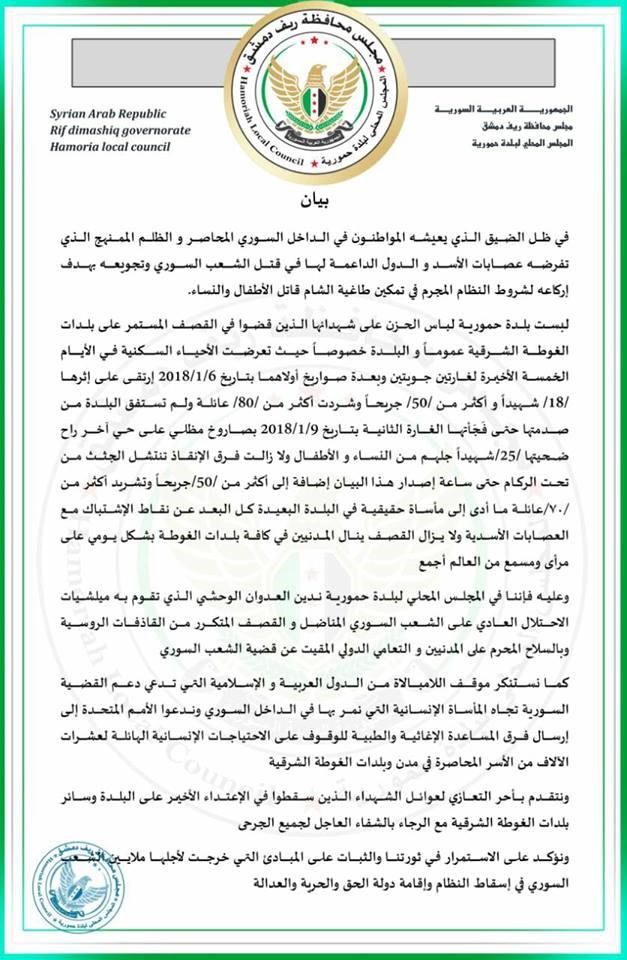
Image shows the statement released by the Hamoryah’s Local Council, in which it condemned targeting the city’s resedintial nieghbourhoods on 6 and 9 January 2018.
Photo credit: The Local Council of Hamoryah city.
Fourth: Dozens of Victims in Various Parts of Eastern Ghouta
The military attacks carried out by the Syrian regular forces and their allies in Eastern Ghouta varied, where on January 13, 2018, the road linking Duma and Harasta, was subjected to a poison gas attack,where several rockets loaded with chemicals believed to be Chlorine Gas, according to many testimonies obtained by STJ, knowing that the strike location was closer to Harasta than to Duma.
The rockets landed behind the positions of Ahrar al-Sham al-Islamiyya Movement (formerly Fajr al-Umma), but the winds blew towards the north-east and carried this gas towards Duma, causing the injury of six civilians including five women and one child, who were soon be taken to Damascus Countryside Specialized Hospital and got the necessary treatment.
On January 17, 2018, 15 civilians, including 7 children and 5 women, were injured in Harasta following the shelling by ground-to-ground local-made “Golan” missiles, which targeted the residential neighbourhoods, according to STJ reporter.
In Irbin town, the humanitarian situation worsened and deteriorated as a result of the ongoing attacks targeted civilians in houses and mosques directly, which led those concerned to form an emergency room on January 18, 2018, to follow up the conditions of people affected, especially those who forced, by shelling, to stay in cellars. The emergency room’s committee counted the damage caused by the campaign and the result it came out with is:
The destruction of 30 per cent of civilian houses, and the displaceement of 2,500 families of which, including 1375 live in cellars, which are only 75 in number, 40 of them are not equipped for habitation, and 17 others are in very poor condition and unfit for living. The number of children, under two years of age, living in cellars is 500.
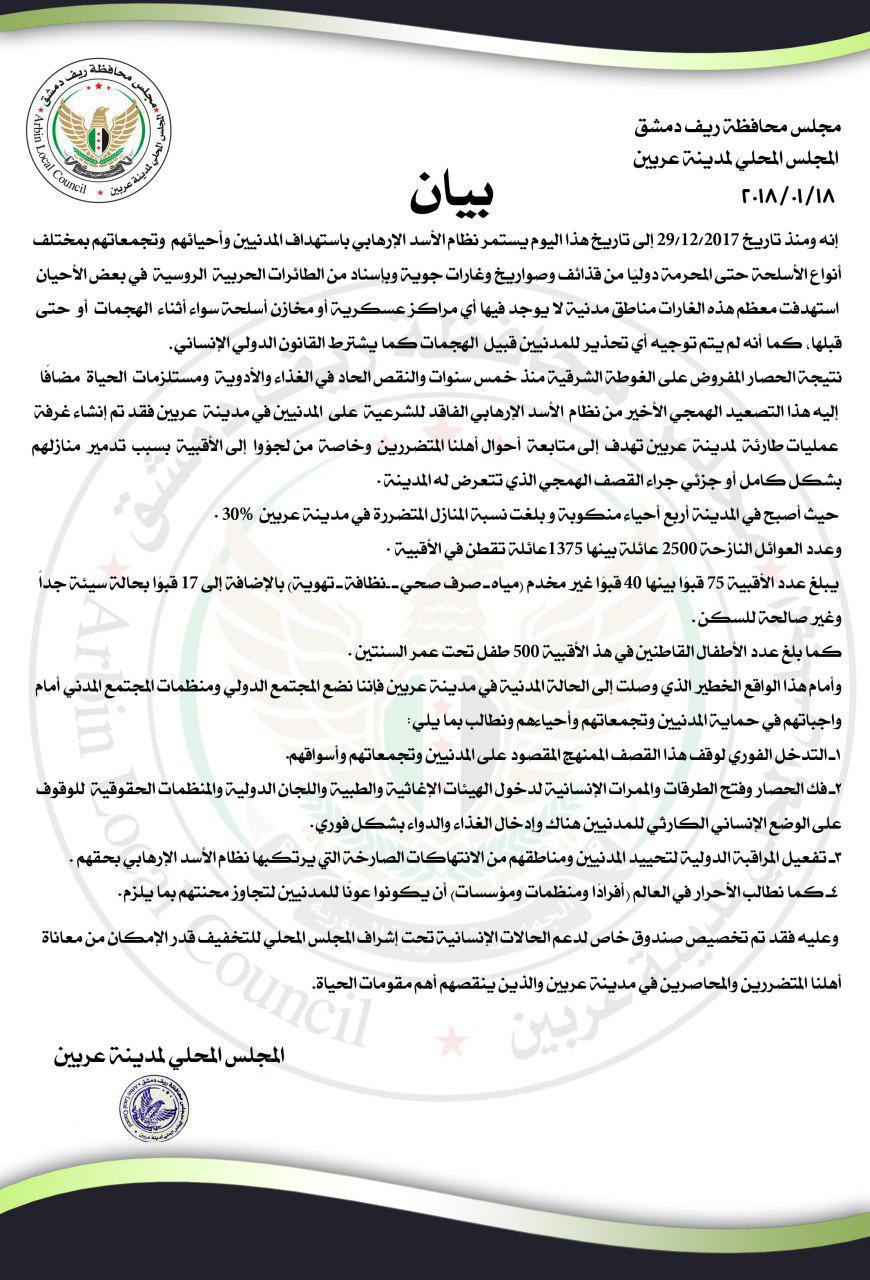
Image shows the statement issued by the Local Council in Irbin town on January 18, 2018, which announced the formation of the emergency room of the town.
Photo credit: Ghouta Media Centre.
On January 20, 2018, the military campaign against the cities and towns of Eastern Ghouta continued with the use of all types of weapons, heavy and medium. The attacks resulted in a number of casaulities, and the most notably was the attack of a popular market in the centre of Duma city, which left a horrific massacre of 10 civilians, according to STJ.
A video footage published by Orient Channel on January 20, 2018 showed the devastation of a popular market in Duma city, being targeted with heavy artillery shelling, which resulted in the death and injury of dozens of civilians.
Fifth: Civilian Deaths by Mortar Shells Fell on Various Parts of Damascus
In parallel with the military escalation on various areas of Eastern Ghouta in Damascus countryside, several areas in Damascus, the capital, and its environs ( under the control of Syrian government forces), were subjected to a number of indiscriminate shells, causing civilian casualties, killed or injured, and a significant material damage in their property.
On December 29, 2017, Ish al-Warwar area and Barzeh neighbourhood were hit by several mortar shells from an unknown place, causing no civilian casualties, noting that this incident coincided with the continuation of clashes between the Syrian regular forces and Ahrar al-Sham al-Islamiyya Movement, in the vicinity of the Military Vehicle Management in Harasta, according to the Facebook bage of Sawt al-Asima news network.
On December 31, 2018, more than 40 mortar shells landed on "Alassad Suburb" area, causing the death of a civilian, as well as considerable material losses, they also caused a power outage in the area, after the main power line was damaged.
By the beginning of 2018, specifically on January 1, 2018, more than 55 shells landed on different areas of Damascus, such as Al Amin, Bab Tuma, Dwel'a neighborhoods and Alassad Suburb, which resulted in the death of at least two civilians. Most of these shells landed at dawn coinciding with the New Year Eve’s celebrations in the capital, according to the Facebook page Yomyat Kzefeht Hawn in Damascus.
On January 2, 2018, a civilian was injured following the fell of six missiles on "Alassad Suburb", where school attendance was suspended and the examinations postponed in the area, owing to its proximity to the areas of clashes, in the vicinity of the Military Vehicle Management in Harasta, as well as the falling of shells on it over the past few days.
On January 4, 2018, Al-Amarah neighborhood and Jaramana area witnessed a bloody day, owing to the fall of three missiles, which caused 22 civilian casualties and 1 death, according to the Facebook news page Dimashq al-Aan (Damascus Now).
On January 6, 2018, El Mantika As-Sina'iyeh and Dwel'a nieghborhoods and Alassad Suburb were subjected to more than 7 mortar shells, causing the death of two civilians and injuring three others at least.
On January 7, 2018, a mortar shell landed on Souk al-Hal in the center of Damascus, and 9 other mortar shells landed on Alassad Suburb, causing the injury of some civilians and material damage.
On January 8, 2018, Bab Tuma, located in the center of Damascus, was hit by two mortar shells, which resulted in the injury of a woman, according to Dimashq al-Aan.
On January 9, 2018, more than 30 mortar shells landed on various areas of Damascus, such as Bab Tuma, Al-Amin and Al Qassaa neighborhoods, Killing 5 civilians and injuring 30, several sources said that one of the shells landed on the "Zaitoun Church” in Bab Sharqi neighborhood in Damascus.
On January 12, 2018, the "Old Damascus" area, including Bab Tuma and Bab Sharqi neighborhoods, was hit by a large number of mortar shells, causing the injury of a number of civilians, including children, according to Sawt al-Asima news network.
On January 15, 2018, several shells landed on Dwel'a nieghborhood, located near Damascus, causing significant material damage, and no casualties.
On January 16, 2018, "Masakin Barzeh" neighborhood was hit by a mortar shell, fired from Mount Qasioun, by the Syrian regular forces, according to some testimonies obtained by STJ, which resulted in the damage of a civilian’s house.
On January 22, 2018, several mortar shells landed on Bab Tuma neighborhood in Damascus, causing the death of 9 and the injury of dozens. In this regard, one of the local sources spoke to STJ, saying:
"The received information says that Ahrar al-Sham al-Islamiyya Movement is the one who fired the mortar shells, caused the last massacre in Bab Tuma neighbourhood, from areas near Damascus, such as Jobar, Zamalka and Ein Tarma, but not Harasta. There is information about the Movement’s use of areas controlled by another faction to launch the shells. Other areas were also targeted by mortar shells fired from Harasta city, such as Alassad Suburb, and there was information in the previous period, confirming that the The al-Rahman Legion was the one who lunched those missiles, along with Ahrar al-Sham al-Islamiyya Movement from several axes, such as al Manasher-Ein Tarma axis or Jobar neighbourhood, near Al Abbassiyyin area, under the pretext of targeting the regime's positions and checkpoints, coinciding with the first days of the battle on the control of Military Vehicles Management in Harasta, noting that no one has claimed such attacks, and it worth mentioning that the military escalation on Eastern Ghouta was accompanied by another escalation on Damascus, as a number of regime-held areas has been hit by shells, knowing that these areas are relatively close to rebel-held ones, such as Alassad Suburb, Ish al-Warwar and Barzeh neighborhoods which are close to Harasta city, controlled by Ahrar al-Sham al-Islamiyya Movement. As for Alassad Suburb all the shells fell on it were fired by Ahrar al-Sham al-Islamiyya Movement, according to information I have got. Noting that the regime fired some mortar shells accedintly on some Damascus areas."

